MILWAUKEE—Happy Thursday! We are enjoying the sights and sounds of beautiful Milwaukee, but apparently not as much as Reps. Mike Lawler and Kat Cammack, who embraced their inner Laverne and Shirley.
Up to Speed (Convention Edition)
- One of the most powerful segments of Wednesday’s programming at the Republican convention focused on the families of the 13 American service members who died during the military withdrawal from Afghanistan in 2021. The normally raucous crowd of delegates was practically silent and rapt with attention as a video played documenting the disastrous end to the 20-year war and what was portrayed as President Joe Biden’s failures to protect the Americans killed by the Taliban as they left the country. The audience was somber afterward as several family members of these fallen heroes shared stories of their loved ones and criticized Biden, especially for his claim in last month’s debate that no troops died overseas during his presidency. And emotions were at an all-time high in the arena as Herman Lopez, father of Marine Cpl. Hunter Lopez, read out the names of all 13 fallen service members. After each name was read, the delegates repeated the name in unison.
- When Usha Vance introduced her husband J.D. prior to his speech, she mentioned that he adapted to her vegetarian lifestyle. Dispatch Politics observed one Texas delegate exclaim, “Oh my God,” after she said it. Usha also noticeably failed to mention Donald Trump by name in her speech.
- Spotted outside the Fiserv Forum Wednesday night: a law enforcement officer stopping Rep. Lauren Boebert of Colorado to ask for a selfie with her. Boebert obliged, turned away, rolled her eyes, and kept walking. A young man in a red MAGA hat then shouted at her “Boebert?” When she looked back to acknowledge him, he asked if he could shake her hand, and she obliged again, before walking away.
- If there’s a Grand Central Station here at the Republican convention, it might be Craft, the restaurant inside The Trade, a hotel directly across the street from Fiserv Forum. Spotted at one point during a busy breakfast hour Wednesday, for example, was Donald Trump Jr. meeting with associates on one end of the restaurant, and Eric Trump, also meeting with people, on the other end. As morning turned to early afternoon, Trump attorney (and convention speaker) Alina Habba stopped by and joined acquaintances for a glass of wine, with several GOP insiders coming and going as the day progressed.
- Is conservative environmentalism having its moment? Charles Hilu has a piece on the homepage today about a growing movement of Republicans and conservatives taking concerns over climate change seriously—and trying to influence their fellow travelers to do the same. Read it here.
- Oh yeah, brother! Professional wrestler Hulk Hogan will speak at the RNC tonight prior to former President Donald Trump’s acceptance speech, NBC News reports.
Up to Speed (Beyond Milwaukee)
- President Joe Biden is more “receptive” to calls within his party to end his reelection bid, CNN reported Wednesday night. While Biden has publicly pushed back on overtures to drop out of the race following his disastrous debate performance three weeks ago, a senior Democratic adviser told CNN that Biden is privately asking whether Vice President Kamala Harris can win against Trump.
- Senate Majority Leader Chuck Schumer is privately encouraging Biden to drop out of the race, ABC News reported Wednesday evening. Schumer, who visited Biden at his Delaware home on Saturday, allegedly told the president that ending his reelection bid would be in the best interest of the Democratic Party. House Democratic leader Hakeem Jeffries also reportedly shares Schumer’s sentiments. In a statement, Schumer dismissed ABC’s report as “idle speculation,” but did not deny the story’s claims.
- Rep. Adam Schiff of California is the latest congressional Democrat to call upon Biden to drop out. Schiff, his party’s nominee for California’s open Senate seat and an ally of former House Speaker Nancy Pelosi, first told the Los Angeles Times that he doubts Biden can defeat Trump this November. Schiff is the 23rd congressional and arguably highest-profile Democrat to call for Biden’s replacement on the party’s presidential ticket.
- Emerson College’s latest survey of Virginia released Thursday morning shows Trump leading Biden 45 percent to 43 percent among registered voters, with 11 percent undecided. When undecided voters were asked what candidate they are leaning toward, support for both Trump and Biden rises to 50 percent. Usually a reliable blue state for Democratic presidential contenders, Virginia has been given battleground status partly due to uncertainty over Biden’s spot on his party’s ticket and Republican Gov. Glenn Youngkin’s support of the 45th president.
Republicans Embrace J.D. Vance
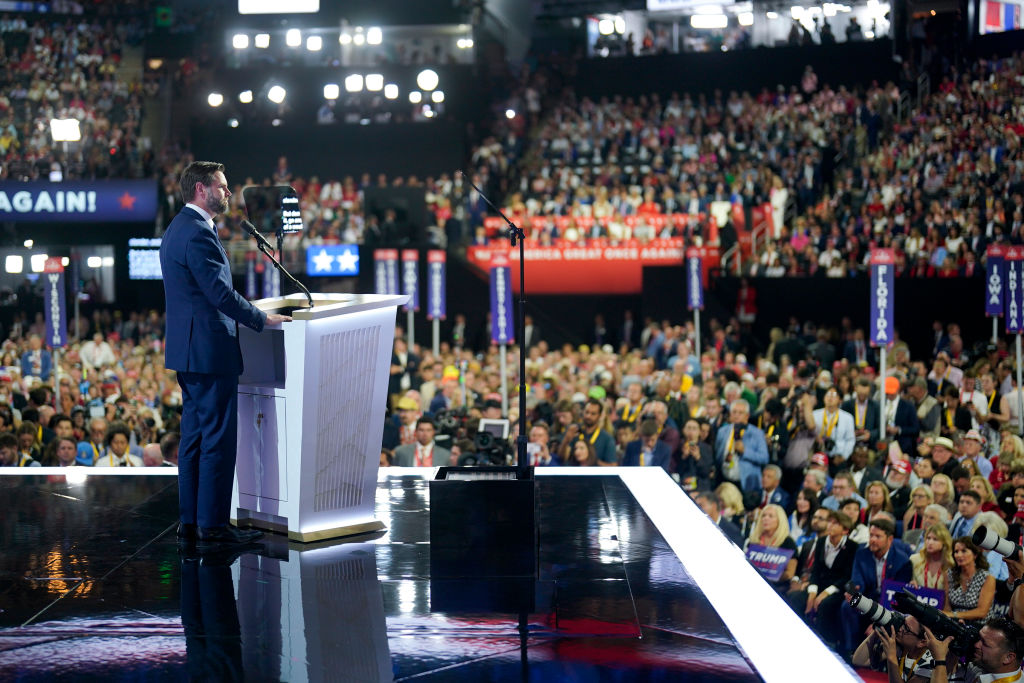
When 2024 GOP vice presidential nominee J.D. Vance took the stage at the Republican National Convention on Wednesday night, he reveled in retelling the biographical story at the heart of his 2016 memoir Hillbilly Elegy, even while partially repudiating its political and sociological conclusions.
As Ohio’s first-term junior senator told the crowd about living the American dream—going from U.S. Marine to Yale Law School graduate to senator and vice presidential nominee, all by the age of 39—his speech was at its strongest when he spoke of his family. His grandmother provided much-needed stability he didn’t receive while his mother struggled with drug addiction. Mamaw was a Christian who also “loved the f-word” and once threatened to run over a friend of J.D.’s who was into drugs, saying: “J.D., no one will ever find out about it.” The crowd laughed, and, as he told Mamaw’s story, erupted at times into cheers of “MA-MAW! MA-MAW! MA-MAW!”
Vance spoke of how his wife, Usha, was the daughter of legal immigrants who made it possible for him to fulfill what he called “my most important” American dream: “becoming a good husband and a good dad.” The emotional high of the speech came when Vance revealed that his mother, who was sitting next to Speaker of the House Mike Johnson in former President Donald Trump’s box, would be 10 years clean and sober in January 2025. “If President Trump’s okay with it, let’s have the celebration in the White House,” Vance said. The crowd cheered: “J.D.’s mom! J.D.’s mom! J.D.’s mom!”
The main sociological point Vance made in Hillbilly Elegy was that the biggest problems facing the white working class are cultural, not political, and those communities only begin to solve them when “we stop blaming Obama or Bush or faceless companies and ask ourselves what we can do to make things better.” But Vance said on Wednesday night that when he now hears of drug overdoses in his hometown, he thinks: “America’s ruling class wrote the checks. Communities like mine paid the price.” While Vance wrote in 2016 that Trump was “cultural heroin,” he said in his 2024 acceptance speech: “President Trump represents America’s last best hope to restore what—if lost—may never be found again.”
To the extent that Vance spoke of policy in his 35-minute speech, he focused on trade, immigration, and war. “Together, we will send our kids to war only when we must. But as President Trump showed with the elimination of ISIS and so much more, when we punch, we’re going to punch hard,” Vance said. Regarding immigration, Vance said that “when we allow newcomers into our American family, we allow them on our terms.” He hit President Joe Biden for supporting the North American Free Trade Agreement, China’s admission to the World Trade Organization, and the 2002 Iraq war authorization. “At each step of the way, in small towns like mine in Ohio, or next door in Pennsylvania or Michigan, in other states across our country, jobs were sent overseas and our children were sent to war,” Vance said. “Somehow, a real estate developer from New York City by the name of Donald J. Trump was right on all of these issues while Biden was wrong.” (Trump actually supported the U.S. invasion of Iraq in 2002.)
Vance also tied economic problems back to immigration, blaming the high cost of housing both on the “Wall Street barons [who] crashed the economy” and the Democrats who “flooded this country with millions of illegal aliens. So citizens had to compete—with people who shouldn’t even be here—for precious housing.”
His speech contained almost no hint of social conservatism. Vance said, “America was indeed founded on brilliant ideas, like the rule of law and religious liberty,” but he did not mention or even allude to the right to life—yet another sign of how skittish the Trump campaign is about the issue of abortion.
Rep. Bill Huizenga of Michigan told Dispatch Politics that Vance’s speech was “very inspirational. It really spoke to, I think, a lot of middle America.”
Former four-term Wisconsin Gov. Tommy Thompson told Dispatch Politics on the convention floor that Vance’s speech “was very emotional” and proved that Vance was “a great pick” for vice president. Vance’s message “is going to resonate across the state of Wisconsin, the Midwest,” Thompson said. “We’re going to carry Wisconsin. We’re going to carry Michigan. We even may carry Minnesota.”
Thompson, who also served as Health and Human Services secretary for President George W. Bush, noted that the “the Republican Party is much more different” than it was in the Reagan and Bush years: “We’re much more pro-labor and getting much more involved with the working individuals.”
“I love the fact that we’re broadening the base of our party,” Thompson said. “The Republican Party has never been this united.”
Why Mike Lee Changed His Mind About Donald Trump
Sen. Mike Lee of Utah is perhaps one of Washington’s most committed converts to Trumpism and to Donald Trump himself. Once a movement conservative stalwart who urged lowering taxes and reining in federal spending, Lee was a vocal opponent to Trump’s nomination through the Republican National Convention in 2016.
These days, though, he is best known as a staunch defender of the former president and the conservative populism Trump has injected into the GOP.
Our colleague Steve Hayes sat down with Lee this week in Milwaukee to discuss how the Republican party has changed and why the Utah Republican believes conservatives should be thrilled with Trump’s record. Here’s an excerpt from the transcript of their interview:
Hayes: I was not a Donald Trump fan. You had been active in the rules, on the floor, trying to prevent Trump’s ascent, trying to prevent him from becoming the nominee. And when we talked—we talked for a long time—you were very concerned about the Republican Party, and what he would do to shape the Republican Party. Fast forward to now, you’ve endorsed him. I would say you’re an enthusiastic supporter of the president. I would love to just have you take me from where we were eight years ago to where we are now, and why you’ve gone through the changes you’ve gone through.
Lee: Sure. Shorter answer is, I didn’t believe him. I didn’t believe he would govern as a conservative. I didn’t like how the primary had gone, and I had three very close friends who had run against him. I didn’t like the way he had interacted with them. I didn’t know the guy, but that’s what I knew about him, was how he had treated them. I also knew that he hadn’t been involved in government and politics recently. I wasn’t sure that he aligned with Republican policies.
Hayes: There were a lot of reasons to believe he wouldn’t align with Republican policies at the time.
Lee: While he and I don’t agree—there are a number of areas in which we take different policy positions—he aligned a lot more with Republican ideals than I expected. In some areas, I was particularly surprised how well things went.
Hayes: Which areas would you specify?
Lee: War, let’s go with war powers first. I’m something of an oddity in that I’m a Republican who really doesn’t like war. I wouldn’t call myself a pacifist. I’m sometimes described as a constitutional realist when it comes to warfare. I want to make sure that we go through the proper constitutional steps before doing it, and want to make sure we go into it with our eyes wide open, lest we end up blindly deferring to the military-industrial complex and to these broad aspirational ideals of how we’re going to make the world safe for democracy. For whatever reason, I had it in my head that this would be one of those areas where he’d end up being an authoritarian, he’d end up—for his own glorification—getting us involved in all sorts of foreign conflicts. It turned out not to be that way. In fact, he ended up being the least warlike president in my lifetime, in our lifetime. It’s not because they didn’t try. They tried to get him involved in conflicts in North Korea, Syria, all kinds of places, and he didn’t do it. I was pleasantly surprised by that.
His judicial nominees were really good. He campaigned as a pro-life president. For some reason, I didn’t believe him, colored by experiences in the primary.
Steve pressed Lee about Trump’s false claims about the 2020 presidential election being stolen. Lee admitted he had a “different take” from Trump on the election but allowed that “weird things” happened in the election.
Hayes: Take something more concrete. Take his call to Brad Raffensperger in Georgia, where he says, “Find me these votes.”
Lee: I would not have advised him to do that.
Hayes: I understand we’re not supposed to say “he’s a threat to democracy,” and I understand why people think that that’s excessive. But that, to me, was a threat to democracy, and lying about the results of the election was a threat to democracy. I guess I’m surprised, given all of that, that people are as comfortable as they are being enthusiastically for him, you included.
Lee: I think he was poorly advised on what Congress could do. I think he saw Congress as the ultimate decider of elections. My take on it at the time was, we have no more authority than the queen of England to correct mistakes, fraud, other anomalies, real or perceived. We have no more authority than the queen of England to do that here. Our role is very simple and straightforward. As long as, as was the case, each state has sent us exactly one slate of electors, those figures are due and undisputed. Our job is linear. It’s simple.
Hayes: But he tried to send multiple slates of electors, right? He was involved in that process. He ended up parting ways with his top law enforcement official, who called all this stuff “bulls—t,” his top military official, because they wouldn’t do things to try to let him remain in power after he lost the election. That’s the bottom line. I can understand what you’re saying about the policy agreements you have with him, even if they’re not mine. But the bottom line for me is, how do you look at what happened on January 6 and its aftermath and the post-election period and say, “Yeah, this is a good thing?”
Lee: If you’re looking for a guy to defend every aspect of his approach to the 2020 election and January 6, I’m not your guy. But … it’s a binary choice.
Pretty well close to the moment he announced that he was running for president again, I think we all knew we were going to face a binary choice. That choice, in my mind, is not close. Now, I faced a binary choice between Hillary Clinton and Donald Trump in 2016 and I voted for Evan McMullin. It was one of the dumber things I’ve done, in part because I’ve got my own thoughts on Evan McMullin that have become more clear since then.
But the binary choice and the binary choice, even just from the standpoint of defense of the Constitution, of truthfulness, of respect for government power and limitations on them, it’s not close. Joe Biden has been the most anti-constitutional president we’ve had, at least since Woodrow Wilson. He may have outdone Woodrow Wilson. He has deliberately undermined the constitutional structure more than any other president, at least since Franklin D. Roosevelt, if not more. He hasn’t quite outdone FDR, in all areas, because unlike FDR, he never actually unfurled, in earnest, a court-packing plan, but he was getting ready to.
Be sure to read the whole thing here.
Notable and Quotable
“We gotta chill with the Ohio love. We gotta win Michigan, too.”
— Ohio Sen. and Republican vice presidential nominee J.D. Vance addressing his home state’s pro-Buckeye delegation during his speech on night three of the RNC in Milwaukee.




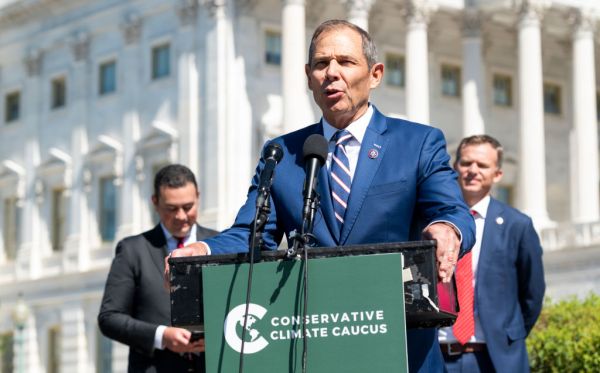
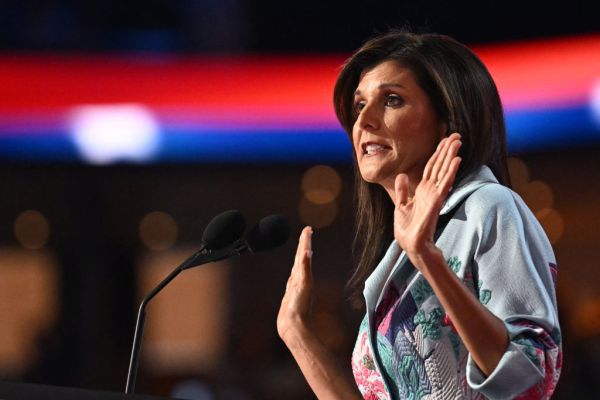
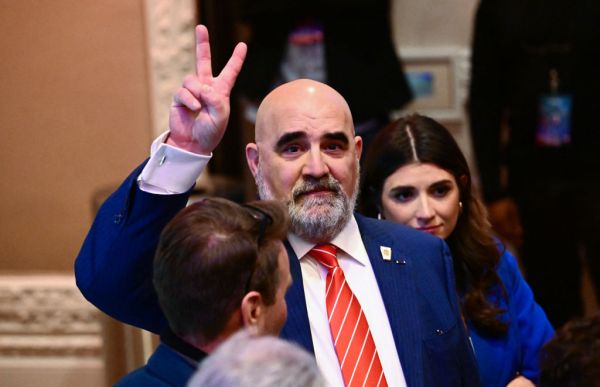

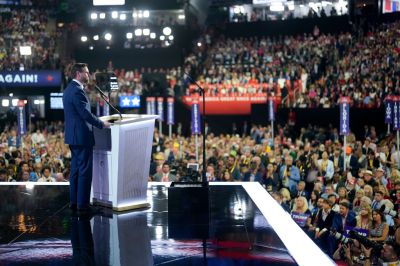
Please note that we at The Dispatch hold ourselves, our work, and our commenters to a higher standard than other places on the internet. We welcome comments that foster genuine debate or discussion—including comments critical of us or our work—but responses that include ad hominem attacks on fellow Dispatch members or are intended to stoke fear and anger may be moderated.
With your membership, you only have the ability to comment on The Morning Dispatch articles. Consider upgrading to join the conversation everywhere.